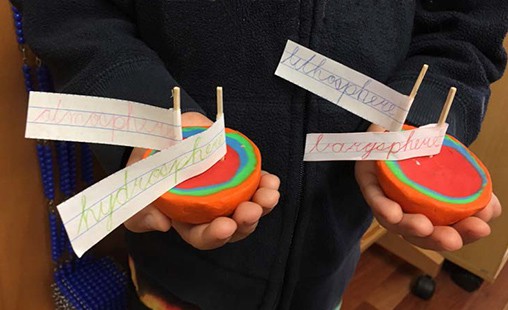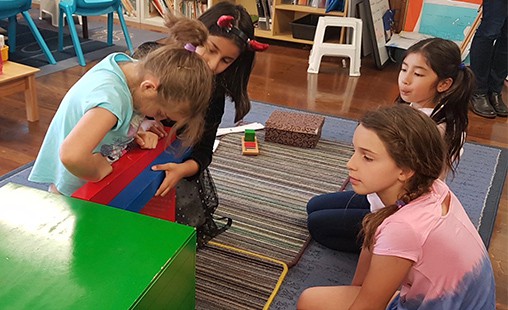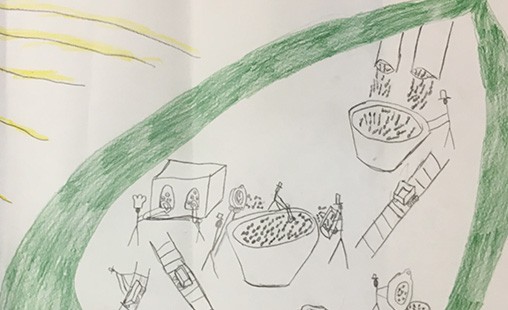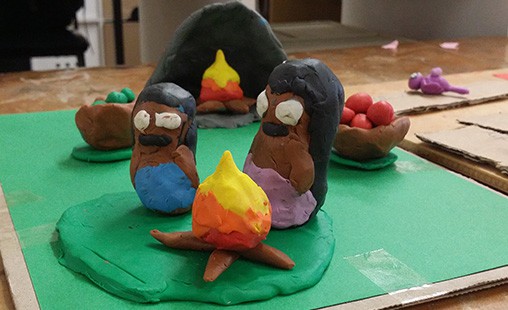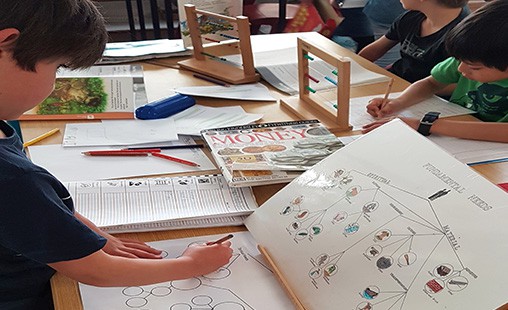Between the ages of 6-9 children seek intellectual independence and greater interaction with peers. Dr Maria Montessori called this stage of learning
“The Reasoning Mind.”
Your child will apply reasoning, imagination and logic to learning. They will seek wider social interactions and begin to develop their conscience and personal identity. Our 6-9 age classrooms support your child to develop respectful relationships and social responsibility as they contribute to a vibrant community.
Developing Intellectual Independence
Have you noticed that your child is interested in discovering and understanding the world around them? Our classrooms support the development of intellect and mental independence that your child will be experiencing during this stage. New materials are introduced as your child moves toward more abstract thinking, expanding their imagination to embrace concepts larger than their immediate environment.
Interest-based learning
Is your child imaginative and curious? A Montessori environment will support their developmental needs by allowing them the time to research, collaborate with others and discover solutions for themselves in a dynamic environment. Our teachers will help your child follow their interests and passions by facilitating the discovery process, sparking their imagination and delivering dynamic presentations. In the Lower Primary 6-9 Program, your child will have the opportunity to pursue their interests in all curricular areas – developing concentration and research skills.
Growing connections
Has your child developed a sense of community? Have their relationships with their peers become very important to them? During this stage of life, your child is becoming more idealistic and will begin the process of understanding justice and developing compassion for others. Groups of children venture out into the wider world to follow particular interests and broaden their experiences. The world becomes their classroom to pursue an integrated curriculum that Dr Maria Montessori termed ‘Cosmic Education’, a foundation for the study of curricular areas all of which are interconnected in life.
Education that goes beyond
Our Lower Primary 6-9 Program and Upper Primary 9-12 Program are both registered with the NSW Education Standards Authority (NESA) and follow their key learning areas. The Montessori National Curriculum follows the key learning areas outlined by NESA. The Montessori Standards are challenging, often with more rigorous academic expectations and scope for deeper understanding of concepts. We like to challenge our students to go beyond the NESA standards.
Your child will become a confident, compassionate and capable individual by engaging in purposeful learning across the following areas (click + to expand each item):
Language
- History of language
- Spoken language – listening and speaking
- Reading – word level and text level
- Word study
- Grammar study for reading fluency – functions of words and grammar boxes
- Grammar study – detailed study of the verb
- Grammar study for reading and writing fluency – sentence analysis (simple and compound)
- Study of style – writing and viewing
- Reading and viewing literary texts
- Reading and viewing factual and persuasive texts
- Writing:
- composing literary, factual and persuasive texts
- handwriting and keyboarding
- spelling
- punctuation
Maths
- History of mathematics
- Numbers to ten (link with Children’s House curriculum)
- Counting (link with Children’s House curriculum)
- The decimal system
- introduction
- operations with whole numbers
- Inter-relationships between operations
- Memorisation
- Addition facts
- Subtraction facts
- Multiplication facts
- Division facts
- Decanomial – table of Pythagoras
- Multiples of numbers
- Passage to abstraction
- Operations
- Addition and subtraction
- Multiplication
- Division
- Decimal system hierarchies – extension
- Fractions
- Introduction to fractions
- Equivalent fractions
- Operations with fractions – same denominators
- Money
- History of money
- Data
- Collecting, representing and interpreting data
Geometry & Measurement
- History of geometry
- History of measurement
- Solid geometry
- Plane geometry
- Introduction
- Constructive triangles
- Detailed study – fundamental concepts
- Detailed study – lines
- Detailed study – angles
- Detailed study – measurement of angles
- Detailed study – polygons
- Inter-relationships between operations
- Tessellation
- Symmetry
- Similarity, congruence and equivalence
- Measurement
- Area of a surface: introduction
- Volume:
- liquid capacity
- Length
- Mass
- Temperature
- Estimation
History, Geography & Science
- Time
- First knowledge
- Measuring time – day, week and month, year and century
- The history of the earth
- The creation of the Universe and the formation of Earth
- The coming of life
- The evolution of life
- Human history
- Fundamental needs of humans
- The coming of humans
- Society and civilisation
- Australian history
- Our nation
- The Earth
- Globes to maps
- Continents and countries:first knowledge
- Landforms
- Maps and plans
- The creation of the universe
- The Earth and the solar system: the sun’s family
- The formation of the earth
- Geography
- First classification
- Solar energy and the Earth
- Movement of the Earth
- Seasons and weather: first knowledge
- Economic geography: the work of humans
- Biology
- The plant kingdom: kinds, parts, functions
- The animal kingdom: kinds, parts, functions
- The vital functions of living things
Art Curriculum
- Introduction to art
- Elements and principals of design
- The seven elements of design
- The seven principles of design
- Study of colour
- Skills and techniques, tools and media
- Sculpture and Ceramics
- Appreciation of visual arts
- Art history
- Artists – life and work
- Folk art
- Art projects: drama work and community building
Music
- Listening
- Percussion
- Singing
- Music theory with the Montessori bells
- Music theory with Montessori tone bars
- Movement
- Rhythm
- Music appreciation
- Music history and literature
- Instruments of the Orchestra
Drama
- Role play
- Drama games
- Interpreting text
- Musical interpretation
- Dramatic productions
- Related activities
Dance
- History of dance
- Principles of movement and choreography
- Dancing to music
- Composing
- Dance styles
- Appreciation
Languages other than English
- Language Use: listening and responding, reading and responding, speaking, writing
- Making Linguistic Connections
- Moving between cultures
Personal Development, Health and Physical Education (PDHPE)
- Personal development (incorporating lessons in grace and courtesy)
- Health awareness
- Physical Education:
- Basic physical fitness
- Sport – ball skills, game skills
- Staying safe
- Physical education: a selection of activities

